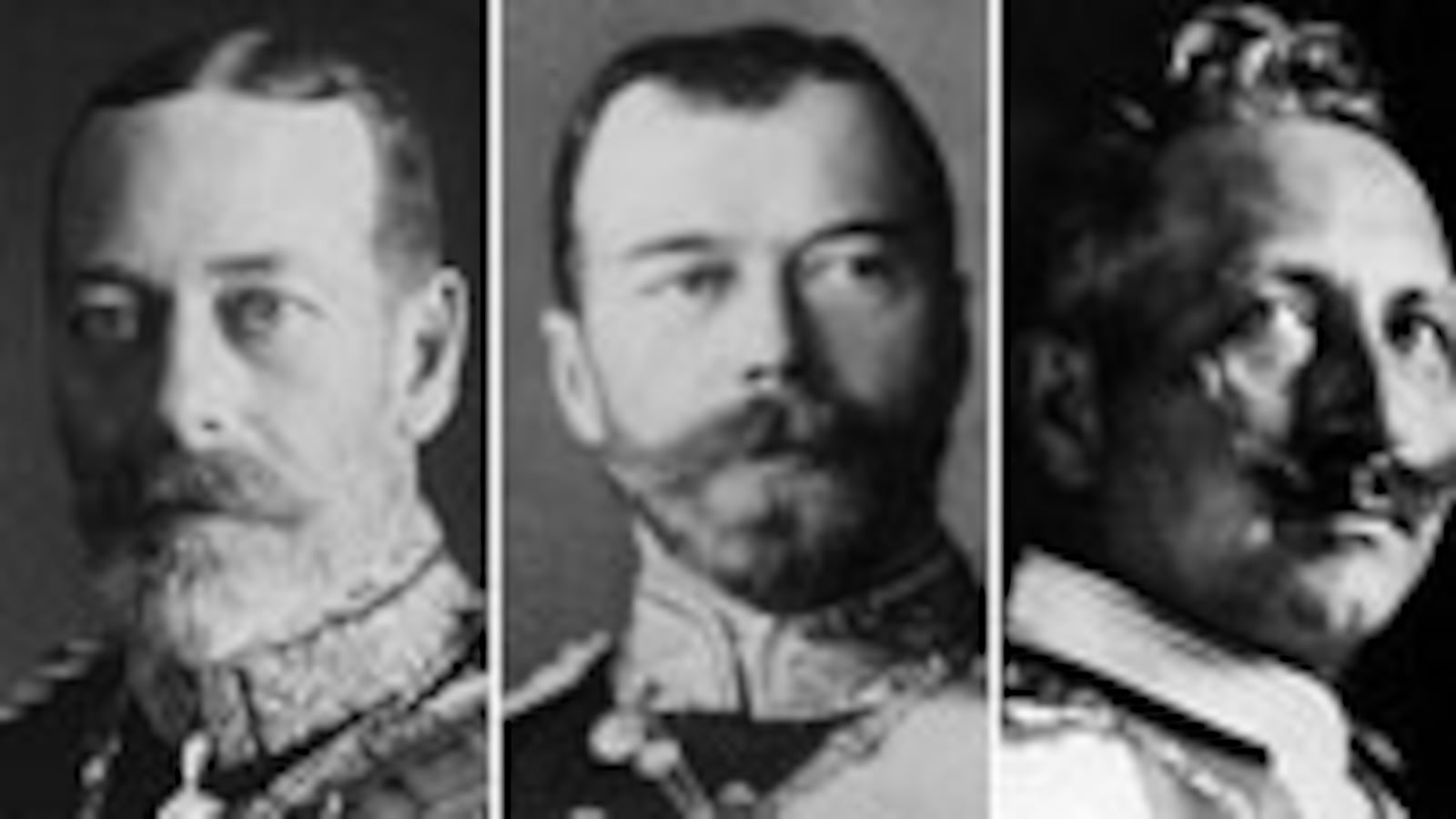
A famous review by Nora Ephron of Jacqueline Susann’s Valley of the Dolls compared reading that most famous of first novels to “masturbating while eating M&Ms,” and the same phrase might be applied to any book that gives the reader a guilty pleasure. It doesn’t have to be a novel, of course. It’s only necessary to experience intense enjoyment coupled with the shame-faced feeling that what we’re reading is, to put it bluntly, good trash. This perfectly describes Miranda Carter’s eminently readable book about the three “royal cousins,” King George V of Great Britain, Czar Nicholas II of Russia, and Emperor Wilhelm II of Germany, “and the road to World War I.” Carter’s chronicle of the lives and families of the three sovereigns is breathlessly fast-paced, full of titillating gossip, outrageously provocative, and great fun.
Carter has correctly assumed that her readership will be more interested in royal hijinks and eccentricities than in the steel production of Germany.
Guilty fun, of course. Serious histories about the origins of World War One have proliferated since 1918, and for the most part can be divided into two different schools of thought. The first is diplomatic history, which seeks in the archives of the major powers the reasons, and more important, the mistakes that brought the war about. The diplomatic history of Europe from 1900 to 1914 has not only fueled many a historian’s career and provided a lifetime of work in the archives for several generations of researchers, it has also produced a volume of weighty tomes in every European language that was large enough to sink a battleship of the Dreadnought Class long before the outbreak of World War Two provided yet another subject for scholarship. Indeed, I suspect that if the total number of books on the causes of World War One (including official publications) were weighed, it would prove heavier than any battleship ever launched. In every country, the bookshelves of libraries groan and warp beneath the weight of books attempting to prove that every other country’s diplomats were wrong, deceitful, stupid, and guilty, while one’s own were thoughtful, innocent and well-intentioned: in short, that the war was somebody else’s fault.

The second school of thought is that no event as large and catastrophic as World War One can be understood or unraveled merely in terms of personalities—that the causes of the war are to be found in sociological terms: fear of rising German industry, as compared to the declining French birth rate; the backwardness of Russian industry; and the increasing expense of maintaining the British Empire, etc.—that, in effect, huge changes in the society and the comparative prosperity of all the major European powers were moving them inexorably toward a catastrophic clash, rather the way unseen changes in the tectonic plates beneath the oceans bring about, without human intervention, earthquakes and tsunamis of fantastic destructive power that can engulf us all.
The leading proponent of this modern way of looking at history, first exemplified (at any rate, in the English language) by John Keynes, whose The Economic Consequences of Peace also analyzed brilliantly the economic causes of the war that had just ended, is Professor Niall Ferguson, whose trenchant and masterly deployment of statistics to explain history was demonstrated in The Pity of War, an account of the First World War, some of which covers much the same ground as Carter’s George, Nicholas, and Wilhelm, but in a very different way.
Rather courageously, Carter has simply ignored all this, on the correct assumption that her readership will be more interested in royal hijinks and eccentricities than in the steel production of Germany, the railway building of Russia, or the politics of vengeance after the defeat of 1871 which lay behind so much of French policy. One consequence is to create a markedly unbalanced book—since France had no king, it plays a minor role in Carter’s account of the road to Armageddon, although it was, in fact, one of the major players; indeed, the French search for security against Germany, from 1871 to 1914, was to some extent the engine driving Europe toward war, since by making an ally of Imperial Russia, and a potential ally of Great Britain, the net effect of French diplomacy was to increase the paranoid fear of isolation and encirclement which lay at the heart of German foreign policy.
Since Austro-Hungary’s Emperor Franz Joseph was not one of Carter’s three royal cousins, she also leaves out of her narrative the Austrian desire to expand in the Balkans which was to provide the fuse that set off the war, just as Bismarck had prophesized when he said that the next great war would be caused “by some damn fool thing in the Balkans.” The emperor was old, crotchety, and weighed down by the tragedies of his family (his estranged wife assassinated by an anarchist while she was boarding a lake steamer in Switzerland, his brother Maximillian shot by a Mexican firing squad after he assumed the throne of Mexico, his son and heir Rudolf, a suicide, together with his mistress, at Mayerling), but the Austro-Hungarian Empire was still a great power, and Austrian policy (intended to preserve Hungarian loyalty by allowing Hungary to expand at the cost of the neighboring Slavs, to hold back the Russians by a lockstep alliance with Imperial Germany, and to keep together under one crown a huge, polyglot empire in the heart of Europe) was one of the major causes of the war, not to speak of the frivolity of diplomacy as practiced from the Ballhausplatz in Vienna, causing one wit to remark, “The situation is desperate, but not serious.”
Carter is pretty much stuck with her three royals in writing about the approach to war, which makes for an amusing and highly readable book, but not for one in which the tragedy of 1914 is seriously explored or explained. The deficiencies in the character and education of George V, Nicholas II, and Wilhelm II certainly did not help matters in the first decade of the 20th century, but even had they been paragons of wisdom, they could hardly have prevented the war. The rivalry between the “great powers” of Europe, intensified by rising nationalism, huge (if selective) prosperity, fear of class warfare, and a rapid increase in modern weapons more or less ensured there would be a war unless the basic differences between the major nations could be solved. War was not, in this case, to use the oft-quoted definition of Von Clausewitz, an extension of diplomacy by other means, but the cataclysmic failure of diplomacy. Not only did the diplomats fail to resolve the differences which separated the great powers, they also wove together such an elaborate web of alliances that when the great crisis came each of the major powers was drawn into the war by just those treaties that were intended to protect it—even the British, who had hoped to avoid just this situation, were drawn in by their 75-year-old guarantee of the neutrality of Belgium.
Carter’s strength is her inexhaustible enthusiasm for those doomed and fascinating figures, whose cousinhood could only be contained and controlled for so long as Queen Victoria lived, but whose human weaknesses, once that formidable presence was removed from the royal scene, added to the likelihood of war: the kaiser, vain and posturing, determined to believe that he was an English gentleman, and compensating for his stunted left arm by flamboyant, militaristic gestures and rhetoric; the tragic czar, henpecked by his beloved wife, and trying to strike an autocratic pose without the character to back it up; poor George V, lacking, to an almost extraordinary degree, the charm and royal presence of his father, and taking refuge in bird shooting, stamp-collecting and bullying his sons, at once a domestic tyrant and a constitutional monarch. All this, together with the social whirl that surrounded them, Carter has recreated brilliantly, in a book which is at once entertaining and deeply sad, for behind the balls, the huge meals, the glittering uniforms and extravagant jewelry, one cannot help recognizing the signs of the impending tragedy, as the settled, prosperous, well-ordered world of late 19th-century Europe teetered on the brink of a precipice, about to produce a crash greater than that of any earthquake, and bring down with it most of the crowned heads of Europe.
This is history at its most entertaining, full of scathing and often witty descriptions of the follies and tragedies of royalty, and the way in which the three royal cousins' lives, despite the deep social divide between the royals and ordinary people, became intertwined with the changes and the dangers confronting the major European powers in the early years of the 20th century. It is a splendid picture, splendidly narrated, with many of the qualities that made Barbara Tuchman’s The Guns of August such a huge and enduring success, and might be read by those who suppose that increased wealth, luxury and trade necessarily guarantee against Armageddon appearing out of nowhere.
Plus: Check out Book Beast, for more news on hot titles and authors and excerpts from the latest books.
New York Times bestselling author Michael Korda's books include Ike, Horse People, Country Matters, Ulysses S. Grant, and Charmed Lives.






